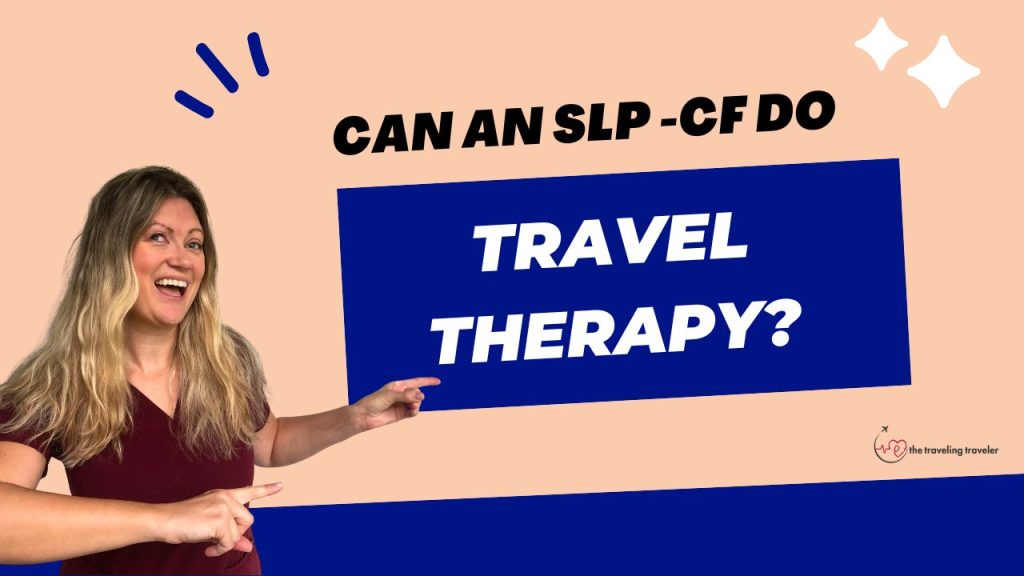Travel therapy sounds like a dream. Traveling the country as a speech-language pathologist and embarking on new adventures every couple of months. But what if you are a new grad? Can you be a traveling SLP clinical fellow?
The short answer is YES, you can travel as an SLP-CF. The longer answer is that maybe it might be best to wait to travel. Let’s delve more into that here.
If you’re new to this website, welcome! My name is Julia, and I’ve worked travel speech pathology contracts on and off for 15 years. I’m an expert guide here to teach you how to be a traveling therapist. One of the first things you need a travel SLP is a recruiter. If you don’t have one, please fill out the contact form below to connect with my favorite recruiter, Kalie, who works with CFs.
What Does It Mean to be a Travel SLP?
A travel SLP is someone who takes short-term contracts away from home. These contracts are typically 13 weeks for medical positions and 9 months for school jobs. The therapist travels to that location and works the job for the length of the contract. When the contract ends, they are essentially unemployed and have to find a new position.
The jobs can be in any setting in any state in the United States. It could be in a beautiful rural town, or a buzzing urban city.
While this may sound exciting and full of adventure, it has it’s downsides.
One thing that almost all travel jobs have in common is that they are desperate for SLP help. Thus, they often have limited SLP resources, including SLPs available to train or supervise. It is not uncommon for you to be the only SLP on staff at a travel job. When travelers start an assignment, they “hit the ground running”. In other words, you start to see a full caseload fairly quickly. Usually, by the end of the first week of work, if not sooner. Building orientation is minimal.
Learn More About Travel Therapy
How to Become a Travel Therapist
The Ultimate Travel Therapy Guide to SLPs
The Ultimate Travel Therapy Guide for PTs
The Ultimate Travel Therapy Guide for OTs
Connect with an AMN Recruiter
Understanding Travel Therapy Pay Rate
How to Find Short-Term Housing for 13-Week Assignments
What is Travel Healthcare?
How To Find Health Insurance as a Travel Therapist
Ultimate Packing List Download
The Expectation of Travel SLPs is to be Clinically Independent
In travel therapy, things move quickly. Within a 1-3 week notice, you will pack up your stuff, find housing, move, unpack your stuff, learn to navigate in a new town, and start a new job. Repeat that cycle every 3-9 months and that’s the life of a travel SLP. Sounds busy, huh?
Imagine doing all of that plus not being comfortable treating a caseload independently. As clinicians, we are always learning, but as a traveler, there is an expectation that you will be independent to treat your caseload with a very minimal orientation period.
Traveling SLP Brittany Bohach worked for a year and a half in a skilled nursing facility (SNF) before she started to travel. The experience in a SNF prior to travel helped her to be independent in the setting and have realistic expectations of the job. Here is Brittany’s advice to SLPs thinking about travel:
“I would definitely advise SLPs to have strong clinical experience as a permanent employee before traveling … It’s generally expected that you are independent while on assignment, as often you are the only SLP at that site.”
Can You Take a Travel Assignment as an SLP-CF?
Yes, technically, you can take a travel assignment as an SLP-CF. Almost 100% of SLP-CF travel assignments are in school districts. A school district assignment lends itself easily to completing the 9-month clinical fellowship requirement.
If you are passionate about working in the school setting or with pediatrics and have strong clinical skills from grad school, taking a travel SLP assignment could be a good fit for you.
Do Staffing Agencies Offer Mentorship for
Travel SLP-CFs?
Yes, there are agencies that offer mentorship programs for SLP-CFs.
However, most agencies will not work with SLP-CFs and most will not have mentorship.
There are only a handful of agencies that work with travel SLP-CFs and will place you with a mentor and supervisor. One agency that has an extensive SLP-CF mentorship program is AMN Healthcare. I worked many jobs for AMN and recommend them as an agency. You are able to connect here to be connected to my personal recruiter who works directly with SLP-CFs.

What About Traveling as a Medical SLP-CF?
This is where things can get tricky. For those interested in being a medical-based SLP, there are virtually no opportunities to travel as an SLP-CF. The majority of medical SLP jobs are in SNFs where you are the only SLP on staff with limited to no access to other SLPs in the area. As a traveler, you are expected to be fully independent clinically, which can be a challenge in the medical setting depending on what your graduate education was like.
Medical settings also want recent medical experience from their travelers. Thus, if you are very interested in traveling and take a school position for your CF, you may have some difficulty finding a medical position that will accept you because you don’t have strong recent medical experience.
Waiting to Get Your CCCs to Travel Isn’t a Bad Thing
As a CF, in many ways you have to be very selfish and think about yourself and your needs. This is the only time of your career that you are going to have dedicated mentorship. Use that to your advantage.
Our clinical fellowships were designed to be a continuation of our learning and to gain 1:1 training on the job. I highly recommend that you find a clinical fellowship that will honor those goals. Find a job to provide you with the best mentorship and training possible.
SLP Brynn Rhodes has worked across medical and pediatric settings for the past 10 years and has supervised students for clinical placements. Reflecting on her own journey, she found that it took months of work and training alongside experienced SLPs working 1:1 to develop the skills and confidence to be comfortable clinically. Brynn offers some advice for CFs considering travel:
“I would caution a new grad about trying to get a CF through traveling in a medical setting, unless they can get a full year contract. The clinical fellowship is still a time of learning with a bit of a safety net through your supervising SLP.”
Travel Therapists Are At-Will Employees
I refer to travel therapy as “high risk, high reward.” Travelers can make a lot of money to travel the country for work, but it comes with risk.
A contract cancellation is one of the biggest travel therapy risks.
Travelers cost buildings a lot of money. For that reason, facilities try to limit the number of travelers hired at any given time. Facilities also cancel travel therapists contracts. It is not uncommon for a travel contract to get canceled days before you are supposed to start work, or during the contract.
As a seasoned traveler, I have been canceled several times and getting canceled really doesn’t bother me. I understand that a cancellation is part of the job and I don’t take it personally. I know that I can pick up and find work easily in another place.
Cancellations for a clinical fellow, however, can be quite a big deal. It would mean not only having to find a new job, but new clinical supervision and more paperwork to send in for licensing.
Bottom Line: Find a CF That Works For You
I can’t stress enough how vital it is to find good supervision during your clinical fellowship. For those therapists interested in working in the schools, there is a possibility that you could find good supervision through a travel SLP-CF position. There are agencies, such an AMN Healthcare, that provide mentorship for CFs. For those interested in working in the medical setting, it will be a very difficult challenge.
Travel SLP jobs will always be there. Travel is there whether you start as a CF or you wait until later in your career. Your clinical fellowship only happens once, so make it count! If you want to connect with my recruiter at AMN, please fill out the form below.
.
